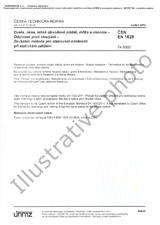We need your consent to use the individual data so that you can see information about your interests, among other things. Click "OK" to give your consent.
ČSN EN ISO 24032 (836454)
Soil quality - In situ caging of snails to assess bioaccumulation of contaminants
Translate name
STANDARD published on 1.8.2022
The information about the standard:
Designation standards: ČSN EN ISO 24032
Classification mark: 836454
Catalog number: 514792
Publication date standards: 1.8.2022
SKU: NS-1067976
The number of pages: 72
Approximate weight : 216 g (0.48 lbs)
Country: Czech technical standard
Category: Technical standards ČSN
The category - similar standards:
Annotation of standard text ČSN EN ISO 24032 (836454):
This document describes a method to assess the bioaccumulation of chemicals in snails, i.e. concentrations of metal(loid)s (ME) or organic compounds [e.g. polycyclic aromatic hydrocarbons (PAHs) and polychlorinated biphenyls (PCBs)] accumulated in their tissues.
This document presents how to prepare snails for caging in situ for 28 days, the in situ test design and then how to collect and prepare the snails until conservation and further analysis. If a kinetic study of accumulation is necessary, sampling of snails at different time-points during exposure is possible as well [13],[19],[22].
This document excludes analytical methods. Preparation (extraction and mineralization) of the samples and quantification of chemicals are not in the scope of the present document
Preview of the standard ČSN EN ISO 24032 (836454)
We recommend:
Technical standards updating
Do you want to make sure you use only the valid technical standards?
We can offer you a solution which will provide you a monthly overview concerning the updating of standards which you use.
Would you like to know more? Look at this page.




 Cookies
Cookies
